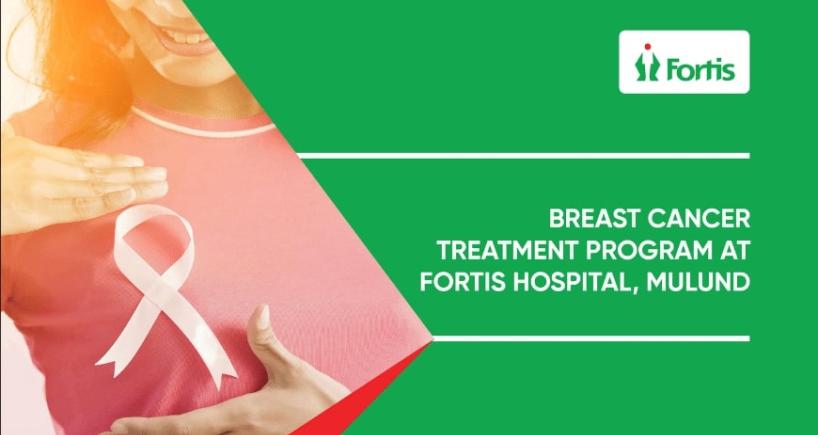
Breast Cancer Treatment Program at Fortis Hospital, Mulund
Breast cancer is the most prevalent cancer in India - with one woman being diagnosed with breast cancer every four minutes and one woman succumbing to the condition every 13 minutes. Breast cancer, if detected early, is one of the most treatable forms or cancers. Depending on the type of breast cancer and how far it has spread, the condition is treated in several ways. The good news is, there have been dramatic advances in breast cancer treatments, bringing new hopes and excitement. Dr Uma Dangi, Consultant Medical Oncology at Fortis Hospital, Mulund, talks about the treatment options offered at the centre and how patients can avail advanced therapies and top doctors under one roof.
Globally recognised as one of the best treatment centres for cancer, including breast cancer, Fortis Hospital, Mulund, is equipped with state-of-the-art technology and world-class facilities. Patients seeking care at the centre will be treated by a dedicated multi-disciplinary team, including breast cancer specialists, who provide expert and personalised care using the latest technology and treatment innovations. Our centre offers a variety of latest treatment options designed to increase the effectiveness of treatment and minimise side effects.
Treatment options for breast cancer include:
-
Surgery: The doctor will suggest the kind of surgery that’s most appropriate for each patient based on various factors, including the size and stage of cancer. The two main types of surgery to treat breast cancer are lumpectomy or breast-conserving surgery (removing only the part of the breast containing the cancer), mastectomy (removing entire breast).
-
Chemotherapy: Chemotherapy uses special drugs to shrink or kill the fast-growing cancer cells. These medicines can be given in veins or taken as pills, or sometimes both. The doctor may recommend chemo after surgery to reduce the risk of breast cancer recurrence. In women with large breast tumours, chemo is sometimes given prior to surgery to shrink a tumour to a size that makes it easier to remove.
-
Targeted drug therapy: These drugs attack specific abnormalities within cancer cells. Targeted drugs, like chemo drugs, enter the bloodstream and reach almost all areas of the body. This makes them an effective treatment against cancers that have spread to distant parts of the body.
-
Immunotherapy: Immunotherapy uses medicines to stimulate a person’s own immune system to identify and destroy breast cancer cells. Immunotherapy might be an option for people with triple-negative breast cancer. It is given in combination with chemotherapy to treat advanced cancer.
-
Hormonal therapy: Hormonal therapy blocks breast cancer cells from getting the hormones (oestrogen and progesterone, which can stimulate cancer growth) they need to know. It can be used before or other treatments, including surgery, to reduce the chance of cancer returning.
-
Radiation therapy: This therapy uses high-energy rays, such as X-rays and protons, to kill cancer cells and shrink tumours. For early-stage breast cancer treatment, radiation therapy is often used after surgery. Radiation therapy may also be used to treat breast cancers that can’t be removed with surgery as well as metastatic breast cancer (cancer has spread to other parts of the body).
Watch: Breast Cancer Treatment
Fortis Hospital, Mulund specialists have expertise in care for all types and stages of breast cancer. The care team considers each patient’s goals and preferences when designing a personalised treatment plan.Fortis Hospital, Mulund specialists have expertise in care for all types and stages of breast cancer. The care team considers each patient’s goals and preferences when designing a personalised treatment plan.



















